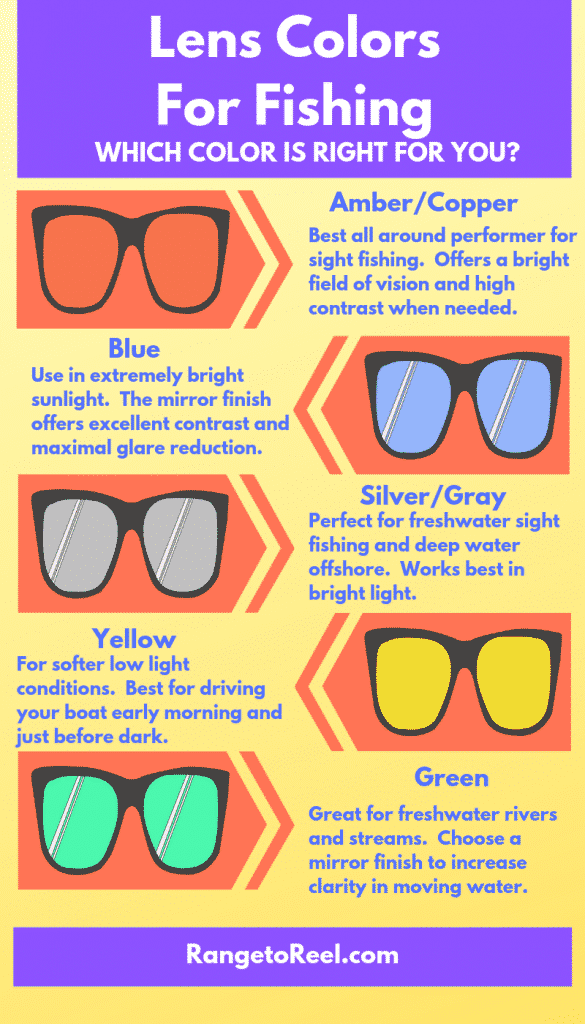Next to your fly reel/rod, your sunglasses are the most important piece of equipment. A good pair of polarized sunglasses is almost a requirement when fly fishing.
Forget those cheap $5 drug store sunglasses that you’ve been using. They might make you look sharp, but they do nothing for your fishing. Instead invest in a pair of high-end polarized sunglasses. Believe me, they’re well worth the money.
Polarized vs Non-Polarized Sunglasses
Don’t even consider buying non-polarized sunglasses for any type of fishing. Polarized lenses are designed to eliminate glare and block vertical light.
Main Advantages:
- Reduces Eyestrain
- Enhances Contrast and Clarity
- Makes Spotting Fish Easier
- Eliminates Glare
- Provides Accurate Color
Polarized Sunglasses For Fly Fishing
When looking for a new pair of polarized sunglasses you need to think about what type of fishing you plan on doing. There’s no one pair of sunglasses that works well no matter the day.
Ideally, you would have a
Sunglasses Color

It can be downright confusing choosing between the different colors of polarized sunglasses. A pair that’s great in bright sunlight might not work as well on a cloudy day. To make things easier he
Amber /Copper
If you’re only going to buy one pair of sunglasses go with an
Amber, brown and copper glasses all work equally well when fishing. The dark colored lens really brings out the contrast when fishing shallow water.
Letting in about 12 percent light these allow you to quickly spot fish in up to 10 ft of water. They also work well when fishing shallow flats, beaches, rivers
Gray and Silver
Bring out your light gray and metallic silver glasses before the sun comes up and whenever you head towards deep water. Silver and Gray glasses are designed to be used in low light conditions.
They let in close to 30 percent light which really brightens things up in the morning. Bring these out whenever you’re fishing offshore in deep water. Those days when the sun’s especially bright on the horizon you can’t go wrong with silver shades. (Kastking’s Ice Mirror Sunglasses)
Yellow
Use yellow lenses whenever there’s softer light. Yellow lenses work best on those cloudy days when your eyes start getting tired, but you really don’t want dark sunglasses.
Yellow lenses work by subtly reducing the glare allowing you to easily spot fish underwater. They don’t significantly block out the sun so go with amber if you only want one pair.
Blue
Choose a blue lens in extremely bright fishing conditions. With a blue/gray base and mirror finish these shades offer excellent glare reduction and high contrast.
Blue lenses might be a little bit dark on your average fishing day, but you’ll be glad you have them midday when the suns at its brightest.
Green
Another utility player on this list. Green lenses work much like the amber and copper hues. They’re perfect for both inshore and offshore fishing.
Stream and River fishing is where green sunglasses really shine. They’re ideal for spot fishing in moving water.
Frame Styles
Frame styles vary greatly from one pair to the next, but it really doesn’t matter much. All that should really matter is function and coverage. Unless you’re bringing out a new girlfriend of course.
Make sure you choose a frame that provides enough coverage over the eyes and goes up almost to the temple. Remember you’re going to be looking down into the water so taller glasses are crucial.
Look for sunglasses that don’t let in any light from the top/bottom or the sides. When you’re out on the water you never know which direction you’re going to face so more coverage is always better.
Just make sure you choose a frame that’s going to remain comfortable through a long day of fishing. Consider a lightweight frame that doesn’t pinch behind your ears.
Glass vs Polycarbonate
In the old
So Which Sunglasses Should You Choose?
Remember that eyewear is always going to be a personal choice. It doesn’t matter what type of frame you choose as long as you focus on lens color and eye coverage.
No matter the sunglasses you choose don’t forget a cheap lanyard to hang them on. It would be a shame if you dropped your brand new shades in the deep blue see.

